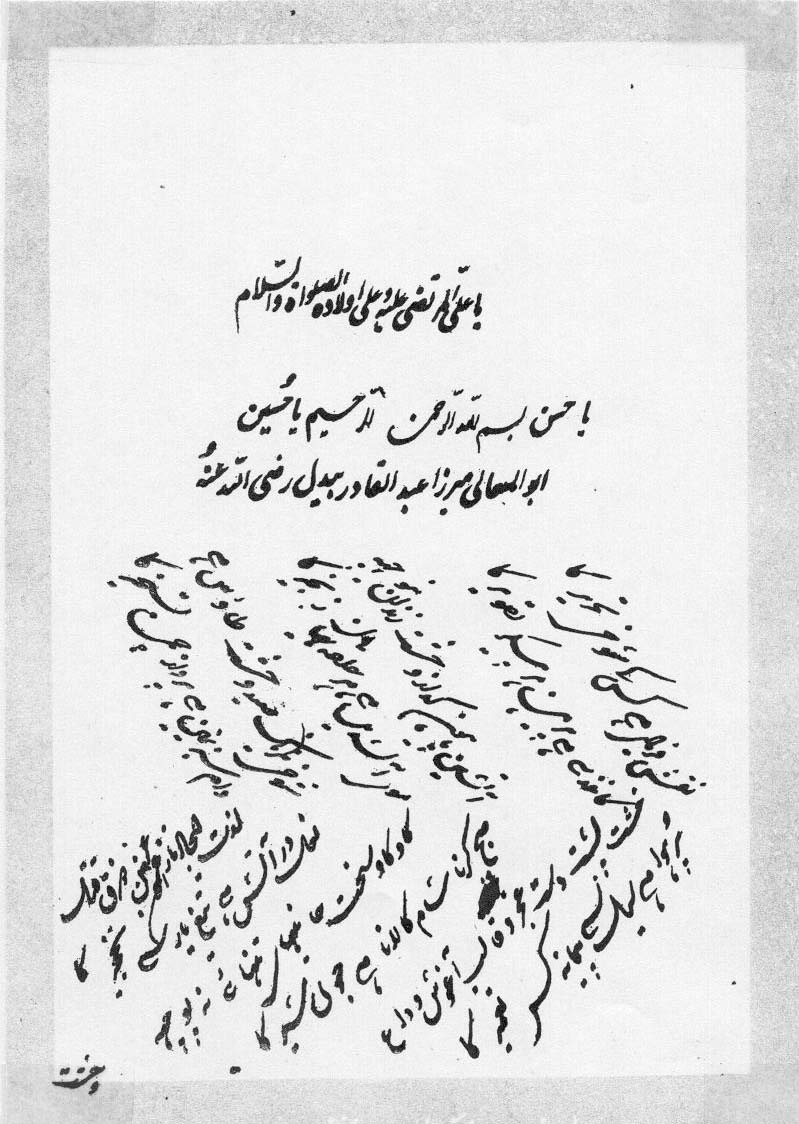FWP:
SETS == IDIOMS;
POETRY
INDEPENDENCE: {9,1}
For discussion of nah sahii , see {175,1}.
I've discussed the larger question of Ghalib and 'meaningless' verses in {141,1}.
As so often, the first line is uninterpretable in itself-- it has no verb or (human) subject. Under mushairah performance conditions, of course, we're made to wait as long as conveniently possible before hearing the second line. When we finally do hear it, we at once annex the first line to the utterance of the speaker of the second line, who is almost petulantly rejecting any desire to achieve the obvious, usual results-- praise, reward-- through his poetry. This attribution works well, and can be read as adding a wonderful note of 'sour grapes' to the disclaimer in the second line.
But of course nothing in the verse formally dictates such a reading. The first line might also be an inventory of the kinds of (undesirable) meaning that might be latently or undetectably present in the speaker's poetry. On this reading, the speaker is congratulating himself on being doubly secure against any tendency to fawn or flatter or seek 'praise' or 'reward'. Not only does he try to banish these unseemly urges in his poetry, but since his poetry is considered meaningless in any case, his integrity is even more perfectly assured. Such an assurance might even be a fair compensation for the critical accusation (or actual audience experience) of meaninglessness itself. This reading correlates well with the emphasis on independence so prominent in Ghalib's ghazals; for more on this, see {9,1}.
Note for grammar fans: The plural hai;N
is used with 'meaning' not because the 'verses' are plural and have separate
'meanings'; in this case, I don't think that's even intended as a secondary
sense. Urdu speakers and writers just normally use ma((nii
with plural verbs, even if the meaning is clearly singular. Contrast this
with the case of a;hvaal , which is the plural of ;haal
but is treated as grammatically singular; it is discussed in {57,4}.

Hali:
One time Maulvi Abd ul-Qadir Rampuri, who was a great jester by temperament, and who had for some time been connected with the Fort of Delhi [=the Court], said to Mirza [Ghalib], 'I don't understand one of your Urdu verses'. And at that moment he composed two lines of verse and recited them before Mirza:
pahle to ro;Gan-e gul bhai;Ns ke a;N;De se nikaal
phir davaa jitnii hai kul bhai;Ns ke a;N;De se nikaal
[First take the essence of the rose
out of the eggs of buffaloes--
And other drugs are there; take those
out of the eggs of buffaloes.]
Hearing this, Mirzaa was quite astonished, and said, 'Far be it from me-- this is not my verse!' Maulvi 'Abd ul-Qadir said, keeping up the joke, 'I myself have seen it in your divan! And if there's a divan here, I can show it to you right now.' Finally Mirza realized that in this guise the Maulvi was objecting to his work, and was insisting that there were verses like this in his divan.
Mirza has alluded to this kind of nit-picking here and there in his Urdu and Persian divans. In Urdu, at one place he says: {175,6}. The opening-verse of another ghazal is: {141,1}.
==Urdu text: Yadgar-e Ghalib, p. 112
==another trans.: Russell and Islam, p. 40; the above translation of the verse is that of Russell and Islam